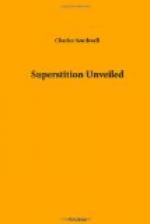The author, while passing an evening with some pleasant people in Ashton-under-Lyne, heard one of them relate that before the schoolmaster had made much progress in that devil-dusted neighbourhood, a labouring man walking out one fine night, saw on the ground a watch, whose ticking was distinctly audible; but never before having seen anything of the kind, he thought it a living creature, and full of fear ran back among his neighbours, exclaiming that he had seen a most marvellous thing, for which he could conceive of no better name than CLICKMITOAD. After recovering from their surprise and terror, this ‘bold peasant’ and his neighbours, all armed with pokers and other formidable weapons, crept up to the ill-starred ticker, and smashed it to pieces.
The moral of this anecdote is no mystery. Our clickmitoadist had never seen watches, knew nothing about watches, and hearing as well as seeing one for the first time, naturally judged it must be an animal. Readers who may feel inclined to laugh at his simplicity, should ask themselves whether, if accustomed to see watches growing upon watch trees, they would feel more astonished than they usually do when observing crystals in process of formation, or cocoa-nuts growing upon cocoa-nut trees; and if as inexperienced with respect to watches, or works of art, more or less analogous to watches, they would not under his circumstances have acted very much as he did.
Supposing, however, that theologians were to succeed in establishing an analogy between ’the contrivances of human art and the various existences of the universe,’ is it not evident that Spinoza’s axiom—of things which having nothing in common one cannot be the cause of the others—is incompatible with belief in the Deity of our Thirty-Nine Articles, or, indeed, belief in any unnatural Designer or Causer of Material Nature. Only existence can have anything in common with existence.
Now, an existence, properly so called, must have at least two attributes, and whatever exhibits two or more attributes is matter. The two attributes necessary to existence are solidity and extension. Take from matter these attributes and matter itself vanishes. That fact was specially testified to by Priestley, who acknowledged the primary truths of Materialism though averse to the legitimate consequences flowing from their recognition.




